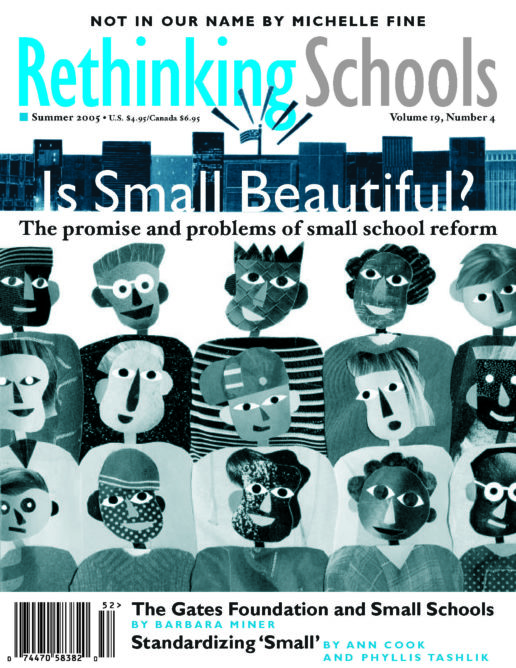Short Stuff 19.4

Harlem Teen Detained
A female 16-year-old Guinean student at Heritage High School in East Harlem was detained for six weeks, along with a female Bangladeshi teen from Queens, based on government “evidence that they plan to be suicide bombers.” So far the government has cited no evidence. The Guinean girl comes from a Muslim family, and wears traditional Islamic dress. She has been released but the second girl remained in custody as the Summer 2005 issue went to press.
No Funding Left?
In the first national lawsuit against the No Child Left Behind (NCLB) law, frustrated educators and parents united to force the Bush administration to pay for its programs. Vermont, Texas, and Michigan school districts, along with the National Education Association (NEA) and other education organizations, filed the suit to end NCLB’s drain on school district money. According to a study released by the Center on Education Policy, about 80 percent of school districts say they have costs associated with NCLB that government funding does not cover. School districts listed as plaintiffs have cut funding from other valuable school programs like foreign languages, science, and art to pay for NCLB mandates.
Stripped of Their Rights
The 6th U.S. Circuit Court of Appeals decided in April that some kinds of student strip-searches are unconstitutional. In the case, a Michigan class was strip-searched after a girl reported $364 stolen. Male students took off their shirts and underwear in a shower room, and girls were stripped to their underwear in a locker room. The search was deemed unconstitutional because it involved a large group of non-consenting students, and because the search was not aimed at preventing danger; it was merely a result of material theft. However, the court did not find grounds to punish the adults who conducted the search because the law was not made clear before the incident.
Commercial KIDS Sprout
A new 24-hour digital cable channel for preschoolers will go on the air next fall. PBS KIDS Sprout, introduced by Comcast, PBS, Sesame Work-shop, and HIT Entertainment, will feature children’s programming — and regular commercials. Local PBS stations must decide whether or not to become affiliated with the digital channel. Affiliated stations would be forced to promote PBS KIDS Sprout and discontinue their own commercial-free digital channel programming for preschoolers. Anti-commercialism activists fear this “sprout” could grow into a vine that strangles commercial-free children’s programming.
Arresting Development
Education on Lockdown: The Schoolhouse to Jailhouse Track examines the effects of zero-tolerance discipline taken too far. Released by Advancement Project, a democracy and racial justice group, the study documents the direct zero-tolerance link from schools to jails, the role of law enforcement in schools, and the impact of zero tolerance on students of color. The report, citing data from Chicago, Denver, and Palm Beach County schools, found many students were receiving “double doses” of discipline, suspension, or expulsion and arrests, for minor and usually nonviolent offenses. The Advancement Project determined that schools increasingly depend on the justice system for discipline and that the “unthinking” zero-tolerance approach to juvenile crime is “derailing the educational process.” See www.advancementproject.org.
Education Not Incarceration Conference
The Education Not Incarceration (ENI) Coalition invites interested educators to a day-long conference “Education or Incarceration: How the growing prison industry threatens America’s public schools and what we can do about it,” which will precede the NEA Annual Convention in Los Angeles June 30.
At the NEA Annual Convention last year, ENI teamed with the NEA’s Peace and Justice Caucus to hold a one-day “Education Not Incarceration” pre-conference, which attracted 1000 NEA members to a speech by Angela Davis. Members passed NEA resolutions supporting education not incarceration and allocated $50,000 to develop “Education Not Incarceration” workshops for NEA Regional Trainings.
Famed union leader and civil rights activist Dolores Huerta will be among this year’s speakers. ENI members will present workshops on advocating for humane state budgets, implementing compassionate school discipline policies, and responding to the crackdown on immigrant youth, among others.
For more information, email ednotinc@riseup.net.
Ohio Rights Fight
The Ohio legislature is considering a proposal to create a new set of content regulations for the state’s colleges and universities. Conservative supporters of the proposal call it the “Academic Bill of Rights,” but opponents, including the American Civil Liberties Union (ACLU), prefer the name “academic bill of restrictions.” The bill is supposed to reverse the supposed “liberal slant” on Ohio campuses. It would prohibit teachers from “persistently introducing controversial matter” in classrooms, and encourages colleges to recognize alternative viewpoints in lessons, grading, and faculty selection. The ACLU-Ohio fears the new restrictions would prevent any discussion of controversial issues on campuses, and says the restrictions promote thought policing and widespread censorship.
Title IX Whistleblowers
A March 29 Supreme Court decision expanded Title IX protection to those who allege unequal treatment under the law’s provisions. Title IX, originally created to prevent discrimination against females in federally funded schools, now includes protective measures for people who report violations. The decision was based on claims that people who report injustices are central to the enforcement of Title IX and that retaliation against these people must be prevented. However, some school districts and officials fear this change will bring about an unnecessary increase in lawsuits against schools that could eventually drain already-scarce funds.
No Shirts, No Rights
The American Civil Liberties Union (ACLU) has taken on the battle for students’ rights to homemade T-shirts. At schools in Missouri and Ohio, the ACLU is demanding an end to censorship of student clothing promoting gay rights and marriage for same-sex couples. At two schools, students were sent home or told to change clothes when they wore homemade T-shirts communicating their support for gay rights. Students tried protesting the punishments, but were not successful in changing the policies. The schools’ actions are in violation of students’ first amendment rights, according to the ACLU, because students at both schools are allowed to wear shirts expressing views about political elections, abortion, and religion.

